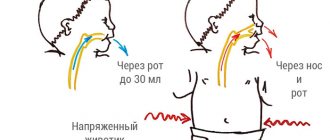Why does a child blink his eyes often - possible reasons
Blinking is a natural process that is necessary to cleanse the conjunctiva of foreign matter. When the eyelids close, small debris, dust, and microscopic impurities are mechanically removed, and the tear fluid is distributed more evenly over the surface of the conjunctiva.
Therefore, it is necessary to blink and conditions in which a person is deprived of this opportunity are dangerous to health.
However, blinking too often indicates that there are significant problems with the condition of the eyes.
External factors (fatigue, speck in the eye, etc.)
The influence of external factors is the most harmless cause of frequent blinking. A speck, eyelash or dust may get into the eye, and blinking is a way to quickly remove the foreign object. Frequent blinking may persist for several minutes after the irritant has been removed from the eye.
Another external factor is dry or very hot air. In this case, blinking works as a protective mechanism to distribute tear fluid and increase its production. If the room where the baby is located has an unfavorable microclimate, the child will blink constantly, and relief will come during a walk.
It’s easy to cope with external factors - just follow the rules of personal hygiene and teach your baby to them, monitor the humidity in the child’s room, ventilate in a timely manner and do wet cleaning.
Eye diseases (dryness, decreased vision, damage, inflammation, etc.)
Frequent blinking is an early symptom of the inflammatory process (conjunctivitis, keratitis, blepharitis). It appears before redness or the appearance of an inflammatory focus becomes noticeable. At the same time, the visible cause of frequent blinking cannot be established, and the baby feels discomfort, cries and tries to rub his eyes (this cannot be done - this can introduce an additional portion of infection into the eye and worsen the condition).
Another reason why your baby blinks frequently is dry conjunctiva. It can be an independent disease - dry eye syndrome - or a symptom of visual fatigue or decreased visual acuity. The symptoms of all these conditions are similar - the child squints, blinks, complains of blurred vision, and the eyes become red. How to distinguish between such conditions before visiting a doctor:
- For dry eye syndrome, the condition is alleviated after sleep and instillation of moisturizing drops;
- When overworked, the condition improves after proper rest;
- When visual acuity decreases, such manipulations do not help.
Other diseases
Diseases not affecting the eyes but causing frequent blinking:
- Allergic reactions (allergic rhinitis);
- Colds, flu, herpes;
- Hormonal disorders (hyperthyroidism, Itsenko-Cushing syndrome);
- Head and neck injuries;
- Pathologies of the facial nerves (trigeminal and facial).
Only a specialist can diagnose such diseases, so if you cannot find out why the baby blinks often, or he complains of other symptoms, he should be taken to the doctor.
Psychological problems
Special mention should be made of psychological disorders. Blinking can be a manifestation of a nervous tic that appears from fatigue, irritability, or in an older child - due to problems at school. A rational distribution of work and rest, selection of physical and emotional stress that corresponds to the baby’s capabilities can help with nervous tics.
Psychological problems can arise when a child goes to kindergarten or school and has problems adapting to a new team. This problem needs to be solved comprehensively with the participation of psychologists and teachers.
Dry eye treatment
There is no single treatment for the disease. After determining the cause of the pathology, specific therapy is prescribed. It includes adjusting the child’s daily routine and taking certain medications. For example, if blinking of the eyelids occurs due to fatigue, the following treatment is prescribed:
- Children’s access to modern gadgets (computers, consoles, phones or tablets) is limited, and time for rest increases;
- It is recommended to walk more in the fresh air;
- the diet is adjusted, which includes a large number of nutrients;
- Drinks containing caffeine are contraindicated.
The drugs can be used only as prescribed by the attending physician, strictly following the indicated course.
Why does a child blink often in front of the TV or computer?
Blinking in front of the TV or computer is a typical symptom of eye strain. A large visual load causes tension in all structures of the eye, and this causes a number of negative phenomena, including dryness of the conjunctiva.
Fatigue occurs with any visual load - reading, needlework, working with small parts, watching TV, working or playing on a computer, so it’s not just devices that are to blame.
You can avoid visual fatigue if you perform special gymnastics for the eyes - a set of exercises does not take much time and does not require special skills. Gymnastics will help relieve vision, reduce fatigue and avoid dry eye syndrome. It is advisable to use drops that moisturize the conjunctiva.
Treatment options
Treatment for frequent blinking in a child depends on the cause of the formation of contractions of the eye muscles. If the tic lasts for a long time, you need to contact a neurologist who, after examining the child, will prescribe treatment.
- Usually the doctor prescribes sedatives: Novopassit, Motherwort, Tenoten.
- To restore brain function, the following are prescribed: Vinpocetine, Finobut, Glycine. If frequent blinking occurs due to external influences, or a disease of the eye area, a visit to an ophthalmologist is required.
- for inflammation, Tetracycline eye ointment is prescribed;
- For dry eyes, use eye drops: Oksial, Slezin.
Treatment of severe forms of inflammation follows a regimen prescribed by a specialist. Constant monitoring of the patient's condition is required. Accelerated blinking is a natural state of the eyes when the body adapts to the environment. This phenomenon requires close attention only if it occurs for a long time; in other cases it is a feature of the child’s behavioral reaction.
What to do
First of all, you should understand the reasons for this child’s behavior. You should start with a careful examination of the eyes - this can be done by the parents or the child himself using a mirror. The examination will reveal trapped foreign particles, if any, or additional symptoms that should alert parents.
If a foreign body gets into the eye, it needs to be washed out. It is best to use lens solution, saline solution or boiled water for this, or, in extreme cases, tap water, but under no circumstances should you rinse your eyes with water from open reservoirs.
The liquid is gently dripped into the outer corner of the eye to speed up the natural process of removing foreign bodies. You can remove a small speck of dust from the inner surface of the eyelid using a cotton pad or clean cloth soaked in saline solution or boiled water. Large foreign bodies should not be removed independently.
If the examination reveals nothing, you can also rinse your eyes. You should pay attention to additional symptoms - redness, blurred vision, itching, etc., compare them with the child’s actions in the next 24 hours and suggest what measures will be effective. For example, if a child’s eyes are red after a sleepless night at the computer, then he should get some sleep soon, and if the itching and blinking are associated with a foreign body that could not be removed, then he should consult a doctor.
Treatment of nervous tics
This disease does not occur without a reason. The basis of any therapy is to find the source of the problem. Adequate treatment includes a whole complex. With the correct attitude of parents towards the baby, the disorder will quickly subside. Otherwise, the disease will only progress, aggravated by depression or childhood nervous breakdowns.
The therapy itself consists of the following:
- Competent diagnosis of the child in order to identify the primary source of stress.
- Correction of the child’s behavior by a child psychologist, who will help him cope with stress, adapt to a new team, and relieve fear. In other words, it will make the patient’s social life more comfortable for him.
- Parents themselves should strive to surround their child with a favorable atmosphere. Watch films or cartoons without scenes of violence and cruelty, do not sort things out between each other, etc.
- Give the patient a small dose of sedatives (Novopassit, tinctures of valerian or motherwort, etc.).
- Regular relaxing baths (pine baths, with sea salt) are effective.
- Drink chamomile tea before bed.
- Light massage with the index finger of the lower eyelid.
- Brief pressure on points located near the outer edge of the eye.
- Performing exercises that target specific muscles.
Therapeutic gymnastics includes the following complex:
- Squeezing and unclenching of the eyes. The movement is made abruptly. They close their eyes tightly and stick their eyes out until tears flow;
- Lightly and quickly blink your eyelashes for 30-60 seconds. This exercise will help cleanse the mucous membranes while moisturizing them.
- Covering the eyelids halfway for a long time. When trembling appears, you should try to stop it.
Facial massage gives good results. It is performed with slow movements, starting with stroking. You can’t put pressure on the skin, or resort to vibration. Be sure to use a massage gel or cream.
In what cases should you consult a doctor?
Parents should be alert to the following symptoms:
- A foreign body that could not be removed at home;
- Signs of inflammation;
- Complaints of blurred vision even after sleep;
- Constant dryness and redness of the eyes for no apparent reason;
- Rapid deterioration of the child's condition;
- Complaints of headache, double vision, suspicion that the child might have hit his head;
- Changes in the child’s behavior – nervousness, irritability, apathy, etc.
It should be borne in mind that the child is not always aware of what is happening to him and how he should react to it. For example, with traumatic brain injuries, he may not remember the moment of impact, and will have to rely on symptoms and the words of witnesses (which are also not always truthful).
Which specialist should I contact?
If there is a need to consult a specialist, you should start with an ophthalmologist. If necessary, he will issue a referral to a neurologist, allergist or endocrinologist. If you suspect that the child hit his head, you need to contact a traumatologist. Psychological problems are solved by a psychologist and teacher.
What diagnostics
Diagnostic procedures begin with a medical examination and medical history. If necessary, visual acuity is determined, the fundus and neurological status are examined. For inflammatory diseases, bacteriological analysis of discharge from the eye is necessary.
If endocrine and allergic diseases are suspected, a blood test for hormones and antigens is required. If injury is suspected, an X-ray and CT scan of the head are performed. The psychologist determines the child’s personality traits and identifies the need for transfer to another group or home schooling.
Doctor Komarovsky's opinion
A well-known pediatrician believes that the problem occurs if the child’s frequent blinking persists for 3 days in a row.
He believes that a common problem is the very approach to how a modern family lives. If parents and children practically do not intersect in the apartment and hardly communicate about their problems and desires, then the child has a great chance of becoming a patient of a neurologist. Any conflict in the family or outside it undermines the already weak psycho-emotional state of the child. Many mothers trust the advice of Dr. Komarovsky, so you need to remember that the doctor talks about emotional arousal and nervous overstrain, leading to frequent blinking. In difficult situations, impressionable children cannot always control their emotions; they are acutely aware of hostile relationships among peers or problems in the family.
That is why parents should take care of a calm environment for the baby, limit his interaction with aggressive children and be there when necessary.
Treatment
Treatment is prescribed by a doctor, and it depends on the specific condition of the patient:
- The foreign body is removed from the eye in the operating room under local anesthesia, then medical supervision is required to avoid complications, and antibiotic drops;
- Inflammatory diseases are treated with antibacterial and anti-inflammatory eye drops;
- Dry eye syndrome requires moisturizing drops, a rational regime of work and rest, and teaching the child to maintain visual hygiene;
- Decreased visual acuity is corrected with glasses;
- Allergic diseases accompanied by dry conjunctiva are treated with antihistamines in tablets and eye drops;
- Hormonal imbalances require observation by an endocrinologist and treatment of the corresponding pathology;
- For traumatic brain injuries, hospitalization and treatment in a hospital are required;
- Neurological diseases are treated by a neurologist;
- Psychological problems require sessions with a psychologist and teacher.
All medications and their dosages are selected by the doctor, and prescribing them yourself is dangerous to your health.
Other reasons
Intense blinking may be a sign of a psychological disorder. In addition, the child may flutter his eyes frequently and strangely due to other factors.
Causes of excessive blinking in children:
- protection of the eye from bright light;
- dryness of the ocular mucosa;
- foreign body (eg eyelash);
- environmental change (cold outside → warmth and dryness indoors);
- pain in the eyes (eg due to inflammation);
- watching TV for too long;
- bad habit;
- consequence of injury;
- teak.
Bad habit
According to experts, most excessive blinking in children is a bad habit; The child is often not aware of the action being performed. The most common reasons for this habit are stress and boredom.
Foreign body
The presence of foreign substances in the eye can cause excessive blinking. An eyelash that gets into the eye does not always come out immediately. It can get stuck, causing discomfort.
Injury
If a child blinks his eyes frequently, the cause may be injury. They are not always obvious at first glance. If you suspect an injury, consult a doctor.
Transient tic disorder
Transient tic disorder, which causes increased blinking, affects up to 28% of schoolchildren. To be diagnosed, a child must have daily tics lasting longer than 4 weeks for at least 1 year. In most cases, tics disappear spontaneously. They do not appear in a dream.
Worsening of the condition can cause stress. Tics can be limited by the will of a person, for example, at school, in the theater. But subsequently their accumulation appears (a phenomenon known as “rebound”), providing internal relaxation.
If persisted for longer than 1 year, more severe tic disorders such as chronic motor/vocal tic disorder are considered.
Tics can be divided by type of expression into:
- motor (motor);
- sound.
Both groups are further divided depending on the complexity of the manifestations into simple and complex. Frequent blinking is a simple motor tic. This group includes movements of individual parts of the face (blinking, closing eyelids, sticking out tongue, etc.). Sometimes twitching of the entire head and limbs occurs. With complex motor tics, frequent blinking may be accompanied by touching something, punching, kicking, jumping, squatting and other actions.
Motor manifestations:
- blinking;
- clenching fists;
- circling shoulders;
- eye rolling;
- spasmodic closing of the eyelids;
- twitching of the head or limbs;
- grinding teeth;
- opening the mouth.
Tourette's syndrome
Tourette syndrome is an inherited neuropsychiatric disorder characterized by uncontrollable auditory or motor tics. This syndrome affects 1 in 1000 people (men are 4 times more likely than women). After birth, the child appears healthy; the disorder appears at about 6 years of age.
Tourette's syndrome is caused by congenital damage to the deep parts (nuclei) of the brain, the basal ganglia. Nerve cells in the basal ganglia communicate using, in part, the chemical dopamine. One of the main causes of Tourette's syndrome is excessive dopamine activity in the basal ganglia.
Although people with Tourette syndrome may appear calm at times, inside they constantly feel protesting muscles that tend to twitch uncontrollably.
Tics occur many times a day and worsen with stress. Their type, intensity, expressiveness can change throughout life. Typically, the patient exhibits both types of tics (motor and auditory). They are preceded by unpleasant sensations (for example, a burning sensation in the eyes that provokes blinking, a stiff neck that recedes after twitching the head, etc.). After performing the tic, the unpleasant sensations subside and temporary relief occurs.
The syndrome is associated with other disorders such as dysgraphia, dyslexia. The extreme manifestation is coprolalia (compulsion to use profanity), hyperactivity.
Supporting measures
In addition to the medications and physical procedures prescribed by the doctor, you can take a number of additional measures that will relieve stress and serve as a good prevention of pathologies.
Gymnastics
It is necessary for everyone who is engaged in work with increased visual load (including schoolchildren). The exercises are aimed at relaxing the eye muscles.
The easiest option is to look into the distance after every hour of working with printed text. A standard set of exercises includes shifting the visual axis left-right and up-down, and rotating the eyes.
Massage
The eyes themselves should not be massaged - this can damage them. But in addition to gymnastics, you can do the following: close your eyes, press your palms tightly against them and massage your eyebrows with your fingers, then carefully move to the upper eyelid (with virtually no pressure), then move your hands to your temples.
Especially useful for those. who works in conditions of improperly organized lighting.
Folk recipes
Traditional medicine suggests washing the eyes with chamomile decoction (room temperature), applying wet tea bags or tea leaves, and soothing infusions of mint, valerian and motherwort to combat blinking.
It is worth using folk remedies only after making sure that you are not allergic to them. To prepare the products, you need to use only high-quality raw materials and boiled water or pharmaceutical saline solution, so as not to cause an infection and not to aggravate the condition.
Why is this happening
Blinking your eyes can increase your concentration on surrounding objects. Allows a person to concentrate thoughts to carry out any actions. During periodic closing of the eyelids, relaxation of the nerve cells of the brain occurs (within a fraction of seconds), which allows the gaze to be better focused.
If the process of rapid blinking in a child is caused by natural stimuli:
- ingress of dust and dirt particles;
- foreign object;
- as a result of strong wind;
- when reading and watching TV for a long time.
Causes of eye blinking in a child
The appearance of this symptom may occur due to ophthalmological or neurological reasons. IN
Using visual and hardware examination, the doctor will determine the condition of the cornea of the eye, whether it is overdried.
If this is the reason behind this pathological process, the doctor will prescribe eye drops to moisturize the cornea.
Eye blinking can also occur:
- as a consequence of microtraumas;
- after penetration of a foreign body.
Sometimes frequent blinking may have a neurological etiology. This is due to the child’s psycho-emotional state, which may be disrupted due to changes in life circumstances (first trip to kindergarten, school).
Based on the above reasons, it is possible to identify the main negative factors that provoke frequent eyelid closure:
Deterioration of visual perception
If frequent blinking is accompanied by a deterioration in visual acuity, a symptom of squinting appears, in which the child tries to focus and concentrate on a specific object. In this case, the symptom of blinking may resemble convulsive squinting of the eyes. It is unacceptable to treat such a condition on your own; it is best to consult an ophthalmologist to establish visual acuity and, if necessary, choose glasses;
It is unacceptable to treat such a condition on your own; it is best to consult an ophthalmologist to establish visual acuity and, if necessary, choose glasses;
Dryness of the eyeball. A dry cornea is the cause of the development of this unpleasant symptom. After prescribing eye drops that moisturize the cornea (Visine), it is necessary to review the child’s daily routine. At the same time, be sure to limit: watching television programs; spending time in front of a computer monitor; reading fiction and educational literature.
Excessive eye strain. This occurs due to the fact that the visual organs are given little time to recover. Daytime and nighttime sleep standards are not observed. Increased school workload in the classroom leads to chronic fatigue and overwork of the visual system, headaches occur, which leads to frequent blinking;
Corneal injury. Sometimes a foreign body can penetrate the eyeball; these can be dust particles, fibers of fabric, or hair. Even after their removal, the symptom of frequent eyelid closure remains. This may be explained by the fact that a foreign body has damaged the mucous membrane of the eye (a small cut or microcrack has appeared);
Blepharitis. This disease has the peculiarity of developing with the appearance of a symptom reminiscent of sand getting into the eye area. Therefore, the child tries to get rid of this sensation by blinking frequently. With this disease, this symptom is observed for a long time. It goes away within a few days after blepharitis is cured;
Development of allergies. Growing homemade indoor flowers is not always a harmless activity. When flowering, pollen can fall on the mucous membrane of the eye, causing a burning sensation of unbearable itching. The eye tries to eliminate external irritants from its mucous membrane, this leads to rapid blinking of the eyelids;
Blepharospasm. This is an involuntary contraction of the facial muscles that are located around the eye. This symptom resembles blinking, but occurs in a more pronounced form, and often looks like prolonged squinting. Such a manifestation of a clinical sign may indicate the presence of: tuberculous-allergic conjunctivitis; keratoconjunctivitis (dry form); trichiasis.
Tiki. To establish the cause of the nervous spasm of the facial muscles (tic), you need to contact a neurologist. Only he can prescribe the correct treatment that will cope with this disease.
Prevention
To avoid frequent blinking, you need to follow a number of rules:
- Maintain normal humidity in the child's room;
- Do wet cleaning regularly to avoid dust;
- Wash your face every day;
- Observe the rules of visual hygiene - eye gymnastics, load distribution, lighting organization;
- Avoid contact with contaminated objects and touching with dirty hands;
- Treat diseases of the eyes and other organs in a timely manner.
Causes of pathology
Involuntary muscle contractions are not a cause for concern. A healthy person is characterized by these processes if they rarely occur. Subtle twitching of the eyes or lips is caused by nervous overexcitation of a person, which disappears soon after taking sedative medications. Whether to contact a doctor in this situation or not is a person’s decision individually. It’s a different matter when eye tics recur regularly in children. This signals the seriousness of the situation.
The factors that cause a child to blink and squint frequently have different origins. The reasons may be ophthalmological dysfunctions or malfunctions of the nervous system. The exact cause of the disease can only be determined by a specialist after diagnosis. Self-treatment is often useless or harmful. It's a waste of money.
Pathologies of the organs of vision
If the child blinks his eyes frequently, then the mother should seek help from an ophthalmologist. Dysfunction is often associated with disruption of the visual organs. These problems are observed due to the following reasons:
Vision can be restored without surgery
Non-surgical eye treatment in 1 month...
>
- Dryness of the cornea. This is a common occurrence among children and is caused by an unhealthy lifestyle. When a baby watches too much TV or does not take his eyes off the monitor for several hours in a row, he overloads his eyes. There is discomfort or itching, a feeling of sand in the cornea. Rapid drying of mucous membranes can be caused by low humidity levels in the room.
- Mechanical damage to the eyes. While playing with friends, the child may not notice it. The situation becomes more complicated when, after an injury, the eyes are rubbed with dirty hands. Because of this, infectious infection of the mucous membranes occurs.
- Conjunctivitis. This inflammation causes swelling or swelling. To get rid of them, the child often closes his eyes.
- Partial loss of visual acuity. Modern children spend a lot of time using gadgets that impair visual perception. Good vision is becoming rare. At the initial stage of pathology, they squint or begin to blink frequently in order to better see the picture.
The given list of causes of pathology is basic, but far from complete. Children at 2 or 3 years old squint their eyes for a reason. Often the latter are hidden in physiological problems. Reflex contractions of the eyes appear after taking certain medications as a side effect. This happens after a traumatic brain injury.
The hereditary factor also plays a big role. There are a great many reasons, so only a specialist can understand them.
Pathologies of the nervous system
It is much worse if the baby blinks heavily or squints for other reasons. Such disorders require long-term treatment. These include the following:
- Stressful situation. It is not easy for children to tolerate nervous tension. The cause of stress can be a change in social circle, severe fear or quarrel. The result of a negative condition is an involuntary contraction of the eye muscles (or a nervous tic).
- Serious injuries to the head or eyes that affect the eye muscles.
- An allergic reaction (or side effect) after taking medications.
Often the cause of the defect is heredity. In this case, the disorder cannot be cured.
Psychological pathologies
The reason for involuntary muscle movement may lie in psychological childhood problems. In addition to the above contractions, the child may have twitching cheeks or mouth, headaches, and so on. This cannot be done without the help of a pediatric neurologist. Family conflicts are dangerous for a child’s psychological health. Negative experiences in the past prevent an adult from building healthy relationships.
As a result of family quarrels, the transmission of muscle impulses in the child’s body is disrupted. The amount of mediator produced in nerve tissues drops sharply. Such a deficiency causes nervous movements of the eye muscles. Nervous tics are especially typical for children 6-7 years old. It is not always associated with genetic inheritance.
When is treatment needed?
Frequent eye blinking in children, the causes of which lie in neurological problems, requires timely treatment. This condition is especially alarming in combination with other tic manifestations. If a child blinks his eyes for more than 3-4 days, he should contact a specialist.
Eye problems also require immediate attention. Frequent blinking can be caused by a foreign object or decreased visual acuity. In such cases, you should not postpone going to the ophthalmologist with your child.
What is an eye tic
This is an uncontrolled, frequently repeated contraction of the eye muscles. The tic occurs quickly, is stereotypical and short-term in nature. Tics (including eye ones) are called hyperkinesis, which means “super movement”. The appearance of hyperkinesis is most often associated with improper functioning of the brain, which issues an erroneous command to the muscles to contract.
In general, this process is not subject to human control.
An ocular nervous tic can occur constantly or occur sporadically when:
- nervous tension;
- exhaustion;
- excessive drop in body temperature.
If spasms pass quickly, appear rarely and disappear on their own, then there are usually no serious problems with nervous health. But sometimes they indicate the presence of problems either with the nerves or with the mucous membranes of the eyes. The eye tic itself is just a symptom that signals a nerve disorder or eye disease.
It is not dangerous, but still visually highlights a person’s facial expressions and can become a cause of ridicule in children’s and teenage groups. Most often, tics are observed in children over 3 years of age and during puberty, when the psyche is most vulnerable. In adults, eye tics can appear after shocking stressful events or nervous stress.










